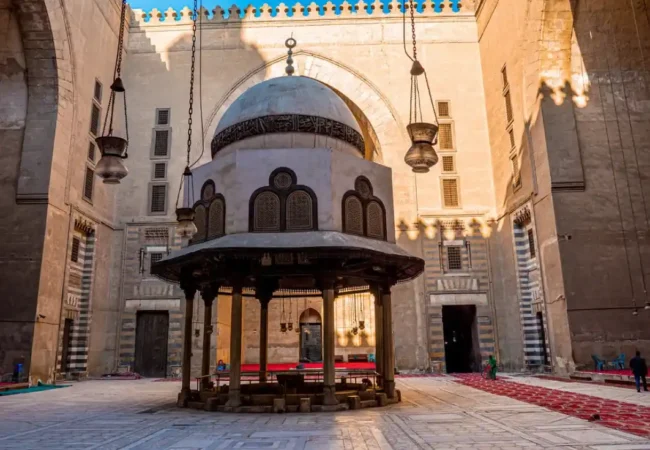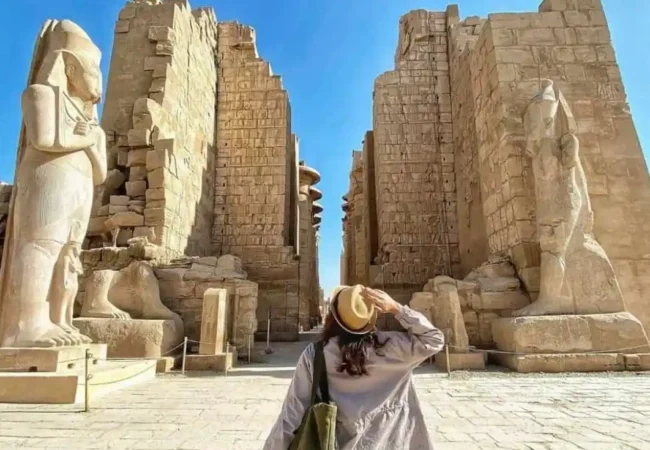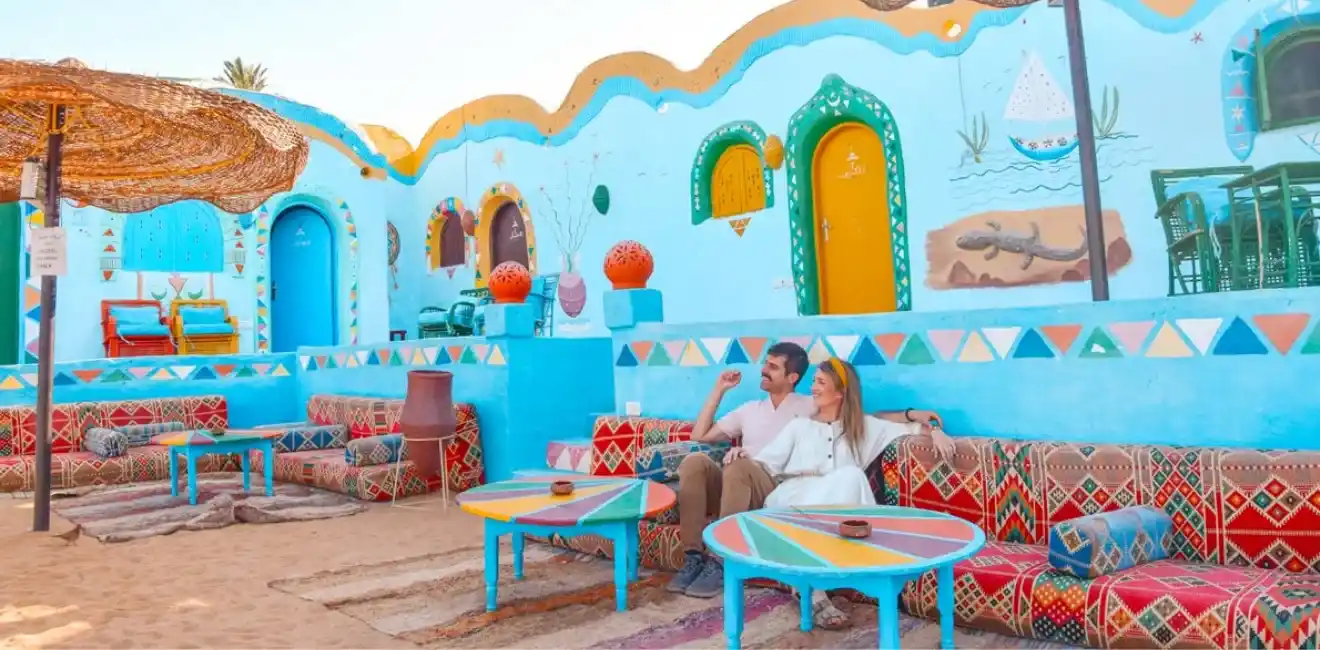
Marriage in ancient Egypt
Marriage in ancient Egypt was considered an extremely important social and religious institution which primarily aimed to ensure the continuity of lineage and maintain the stability of the family and society as a whole.
Marriage was not just an emotional relationship, it was formally regulated by written contracts that documented the mutual rights and duties between the spouses.
This regulation reflects the balance and mutual respect between them.
Marriage played a pivotal role in political and social life, especially within the royal family, where it was sometimes used as an important means to consolidate political alliances and enhance ruling power.
In the view of the ancient Egyptians, marriage was considered a social and even sacred institution primarily aimed at preserving family and societal order and ensuring the continuity of lineage and dynasty.
Marriage was not merely an emotional relationship between two parties; it also had significant religious, social and economic dimensions.
The union of spouses and the formation of a family were considered an essential part of the cosmic order (Ma’at) that must be maintained and promoted.
The ancient Egyptians highly valued family stability and marriage often occurred with the approval and support of both families.
It was usually formalized with an official, documented contract that clearly guaranteed the financial and personal rights and duties of both parties.
It is truly impressive that ancient Egyptian women enjoyed a high legal and social status within the family and society in general.
They had the full right to inheritance, ownership and divorce and sometimes owned real estate and land and managed their own financial affairs independently.
The concept of marriage and women’s rights in ancient Egypt reflects an advanced civilization that recognized the values of balance and mutual respect between the sexes, indicating significant and early intellectual and social development in that important historical era.
Famous marriages in ancient Egypt
Some royal marriages were not merely personal family ties but were also strategic political and religious alliances that significantly influenced the course of ancient Egyptian history.
Among the most prominent of these marriages that left a clear mark are:
Marriage of Amenhotep III to Queen Tiye
This marriage was not just a personal bond between a pharaoh and a lady of non-royal origin, but it had a very significant impact on Egyptian politics.
Queen Tiye played an important political and diplomatic role in internal and external affairs and even had considerable influence in managing the kingdom alongside her husband.
Marriage of Akhenaten to Nefertiti
Their marriage was one of the most prominent and famous royal marriages in ancient Egypt.
Nefertiti was renowned for her legendary beauty, wisdom and influence.
She played a prominent and pivotal role in promoting and supporting her husband’s religious revolution and the worship of the god Aten alongside her husband.
The strong relationship between them was central and fundamental during his controversial religious and cultural reign.
Marriage of Ramesses II to Nefertari
This marriage is considered one of the most prominent and romantic royal marriages in ancient Egypt.
This marriage played an important role in enhancing the image of the loving king and stability within the kingdom.
This marriage expressed a deep and clear relationship of love and respect between the spouses which was wonderfully artistically embodied in the reliefs and artworks found in the temples of Abu Simbel and elsewhere.
Marriage of Tutankhamun to Ankhesenamun
This marriage between half-siblings, the daughter of Akhenaten, was an essential part of the state officials’ attempt to restore stability to the kingdom after the significant religious and political changes Egypt witnessed during their parents’ reign.
This marriage served as a symbol of the return to the traditional religious and royal order after a period of turmoil and change.
The appropriate age for marriage
In ancient Egypt, it is believed that the appropriate age for marriage was relatively early compared to the present era and it was often linked to physical maturity, the ability to procreate and bearing family responsibilities.
In general, the appropriate age for marriage is a relative matter that varies across cultures and eras, but it is often linked to physical, mental and emotional maturity and psychological and material readiness to bear responsibility.
In the modern era, the most appropriate age for marriage is viewed as the time when an individual is capable and ready to make mature decisions and build a relationship based on understanding, partnership and mutual respect.
Choosing the timing of marriage, in general, should not be merely a response to social or family pressures, but should be a personal decision stemming from full awareness of the requirements and challenges of married life.
Recent studies indicate that marrying at a relatively later age may provide a greater opportunity to gain life experiences and achieve professional, emotional and financial stability which may increase the chances of the marital relationship’s success and longevity in the long term.
Marriage contracts in ancient Egypt
Marriage in ancient Egypt was not just a social or religious relationship; it was also regulated by formal legal contracts that reflect the ancient Egyptians’ awareness of the importance of clearly defining rights and duties within the family institution.
- Marriage contracts were usually written on papyrus scrolls in different scripts (Hieratic or Demotic) and formally documented in the presence of several trusted witnesses.
- The contracts often contained basic information about the parties, such as names, sometimes titles, location and the exact date the contract was concluded.
- The contracts included clear and detailed conditions such as the value and nature of the dowry, the gifts presented and the wife’s financial rights in case of divorce or the husband’s death.
- Some discovered contracts also included mutual pledges of good treatment, fidelity and loyalty, reflecting the prevailing moral and social values.
- These legal contracts were used as a binding legal reference in case of disputes between the spouses or their families, indicating the development of the legal and judicial system in regulating personal status.
How were marriages documented in ancient Egypt?
The documentation of marriages in ancient Egypt was done in an organized manner that reflects the organization and precision known to that ancient civilization.
Marriage contracts were not merely casual oral agreements.
They were carefully documented in writing on papyrus scrolls, in the presence of several trusted witnesses and with the explicit consent of both parties or sometimes their agents.
The contract usually included important details such as the names of the spouses and their families, the material and moral conditions of the marriage and the financial rights of each party, including the value of the dowry and other obligations and what the wife might receive in the event of divorce or widowhood.
These contracts were officially and legally recognized and used as a primary reference in case of dispute or disagreement.
This advanced method of documentation shows the extent of the ancient Egyptians’ respect for the institution of marriage and their keenness to ensure justice, transparency and clarity in important family relationships.
Legal rights of women in ancient Egypt
Women in ancient Egypt enjoyed a relatively advanced and unique legal status compared to women in other contemporary civilizations of the same era.
They possessed, at least theoretically and in many cases practically, largely integrated rights that enabled them to be active members and independent parties in society.
They had the ability to manage their personal and financial affairs with considerable freedom.
- Women theoretically had the full right to own real estate and movable property and to sell or lease it without always needing the approval of a guardian or husband.
- They had the right to inherit from their parents and husband in some cases and also had the right to bequeath their property to their children.
- They were allowed the possibility of bringing cases before local or central courts and representing themselves legally in some circumstances which indicates the state’s recognition of part of their legal capacity.
- Within marriage, written contracts particularly guaranteed their financial rights, often stipulating compensation in case of divorce and sometimes included additional clauses protecting them from insult or neglect by the husband.
- Their participation was not limited to household chores; some women contributed to economic activities such as grain trading, textile manufacturing and even managing temple affairs as priestesses for certain deities during some periods.
Divorce in ancient Egypt
Divorce in ancient Egypt was possible and socially acceptable to some extent.
It was usually carried out in a legally organized manner that reflected respect for individual rights, especially women’s financial rights.
Divorce was not exclusively the right of the man as women also had the right, under certain circumstances and specific conditions, to request separation if they were significantly harmed by the marital relationship or no longer wished to continue it.
Divorce was sometimes documented with an official written document, stating the reasons for separation or simply the fact of its occurrence and the agreed-upon terms regarding property and children, if any, such as compensation for the wife or her right to keep her dowry or part of the joint property.
This legal regulation reveals the extent of the development and relativity of legal and social thought in ancient Egypt and confirms that women enjoyed a reasonable degree of independence and dignity even in the case of separation.
The regulation of marriage in ancient Egypt reflects not only the prevailing social and religious traditions but also the civilizational and legal progress that the ancient Egyptians enjoyed in meticulously organizing family relationships.
This perspective on marriage in ancient Egypt stands as testimony to the great appreciation for the family institution and its pivotal role in achieving balance between individuals and society.
FAQs
How were wives treated in ancient Egypt?
Generally, wives were treated with great respect and appreciation. They held a prestigious position within the family as the “lady of the house” and had written legal rights which included the possibility of inheritance, ownership and even the right to request a divorce.
Why did ancient Egyptians marry their daughters?
Marriage among relatives, including sometimes the marriage of a brother to his sister, especially within the Pharaonic royal family, primarily aimed to preserve the purity of the divine royal bloodline, ensure the continuity of the dynasty and concentrate power and wealth within the ruling family.
Can a man marry two wives legally in Egypt?
Yes, in modern Egyptian law, the Personal Status Law derived from Islamic Sharia permits polygyny for Muslims, but under specific and sometimes difficult-to-meet conditions, notably the ability to provide complete justice between wives and financial capability.
In ancient Egypt, polygyny for kings and the wealthy was possible, but it was relatively rare for the common people and mostly confined to the upper and royal classes.
Who pays for the wedding in Egypt?
In modern Egypt, the groom usually bears the larger portion of the wedding costs, including preparing the marital home, the dowry and the gold jewelry, with varying participation from the bride’s family in some costs like the bride’s trousseau.






























